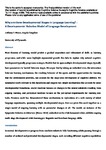Why Are There Developmental Stages in Language Learning? A Developmental Robotics Model of Language Development
| dc.contributor.author | Morse, AF | |
| dc.contributor.author | Cangelosi, Angelo | |
| dc.date.accessioned | 2016-11-10T09:06:33Z | |
| dc.date.accessioned | 2016-11-10T16:30:04Z | |
| dc.date.accessioned | 2016-11-10T16:31:11Z | |
| dc.date.accessioned | 2017-02-19T15:23:20Z | |
| dc.date.available | 2016-11-10T09:06:33Z | |
| dc.date.available | 2016-11-10T16:30:04Z | |
| dc.date.available | 2016-11-10T16:31:11Z | |
| dc.date.issued | 2016-09-28 | |
| dc.identifier.issn | 0364-0213 | |
| dc.identifier.issn | 1551-6709 | |
| dc.identifier.uri | http://hdl.handle.net/10026.1/8538 | |
| dc.description.abstract |
Most theories of learning would predict a gradual acquisition and refinement of skills as learning progresses, and while some highlight exponential growth, this fails to explain why natural cognitive development typically progresses in stages. Models that do span multiple developmental stages typically have parameters to “switch” between stages. We argue that by taking an embodied view, the interaction between learning mechanisms, the resulting behavior of the agent, and the opportunities for learning that the environment provides can account for the stage-wise development of cognitive abilities. We summarize work relevant to this hypothesis and suggest two simple mechanisms that account for some developmental transitions: neural readiness focuses on changes in the neural substrate resulting from ongoing learning, and perceptual readiness focuses on the perceptual requirements for learning new tasks. Previous work has demonstrated these mechanisms in replications of a wide variety of infant language experiments, spanning multiple developmental stages. Here we piece this work together as a single model of ongoing learning with no parameter changes at all. The model, an instance of the Epigenetic Robotics Architecture (Morse et al 2010) embodied on the iCub humanoid robot, exhibits ongoing multi-stage development while learning pre-linguistic and then basic language skills. | |
| dc.format.extent | 32-51 | |
| dc.format.medium | Print-Electronic | |
| dc.language | en | |
| dc.language.iso | en | |
| dc.publisher | Wiley | |
| dc.relation.replaces | http://hdl.handle.net/10026.1/6697 | |
| dc.relation.replaces | 10026.1/6697 | |
| dc.relation.replaces | http://hdl.handle.net/10026.1/6705 | |
| dc.relation.replaces | 10026.1/6705 | |
| dc.relation.replaces | http://hdl.handle.net/10026.1/6706 | |
| dc.relation.replaces | 10026.1/6706 | |
| dc.subject | Developmental robotics | |
| dc.subject | Language learning | |
| dc.subject | Cognitive architecture | |
| dc.subject | Ongoing development | |
| dc.title | Why Are There Developmental Stages in Language Learning? A Developmental Robotics Model of Language Development | |
| dc.type | journal-article | |
| dc.type | Journal Article | |
| dc.type | Research Support, Non-U.S. Gov't | |
| plymouth.author-url | https://www.webofscience.com/api/gateway?GWVersion=2&SrcApp=PARTNER_APP&SrcAuth=LinksAMR&KeyUT=WOS:000397500800003&DestLinkType=FullRecord&DestApp=ALL_WOS&UsrCustomerID=11bb513d99f797142bcfeffcc58ea008 | |
| plymouth.issue | S1 | |
| plymouth.volume | 41 | |
| plymouth.publication-status | Published | |
| plymouth.journal | Cognitive Science | |
| dc.identifier.doi | 10.1111/cogs.12390 | |
| plymouth.organisational-group | /Plymouth | |
| plymouth.organisational-group | /Plymouth/Faculty of Science and Engineering | |
| plymouth.organisational-group | /Plymouth/Research Groups | |
| plymouth.organisational-group | /Plymouth/Research Groups/Institute of Health and Community | |
| plymouth.organisational-group | /Plymouth/Research Groups/Marine Institute | |
| dc.publisher.place | United States | |
| dcterms.dateAccepted | 2016-02-08 | |
| dc.rights.embargodate | 2017-9-28 | |
| dc.identifier.eissn | 1551-6709 | |
| dc.rights.embargoperiod | 12 months | |
| rioxxterms.versionofrecord | 10.1111/cogs.12390 | |
| rioxxterms.licenseref.uri | http://www.rioxx.net/licenses/under-embargo-all-rights-reserved | |
| rioxxterms.licenseref.startdate | 2016-09-28 | |
| rioxxterms.type | Journal Article/Review |


